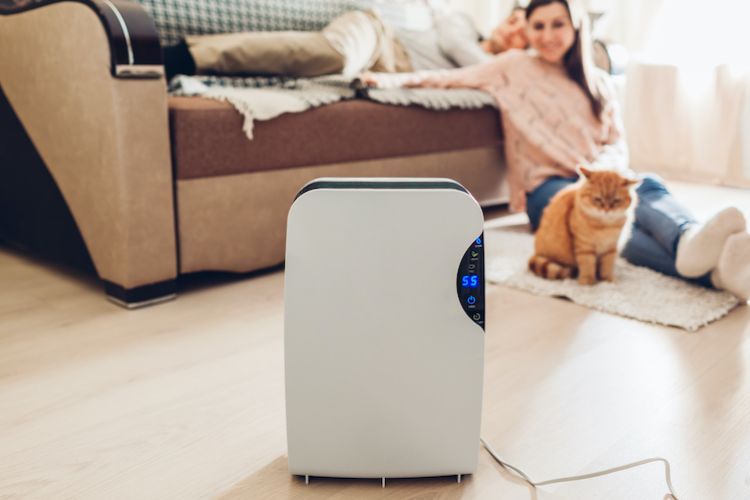Keep Smoke out of your House with an Air Purifier
Posted on Monday, March 08, 2021
To keep this site free for consumers, we receive compensation for customer referrals.
Dealing with pollutants from car smog and factories is enough to make you want to plug your nose. But if you live along the Pacific Coast, you’ve got yet another source of polluted air: wildfires. Every year, residents in California, Oregon, and Washington find many of their forests go up in flames. Skies stop being sunny and blue and start looking like a brown and murky swamp. Not only is it unnerving to see this, but imagine what your poor lungs might be breathing in.
News reports warn that spending time outdoors can make exposure to the irritating chemicals of fires even worse. To many, though, indoors isn’t all that much better. So, we’re left wondering if there is anything that can be done to reduce the irritating smoke. Luckily, we have the ability to clean up the air inside our home to help us face these daunting situations.
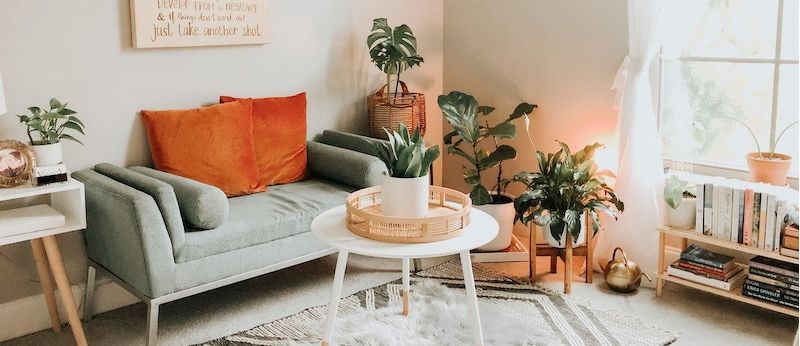
How dangerous is wildfire smoke?
Wildfire smoke can make even healthy people feel sick, and it’s no wonder why. Wildfires don’t just burn timber — when buildings catch fire, chemicals are released. Along with vegetation, trash catches flame, creating a potent cocktail of noxious fumes.
So, what happens to you if you happen to breathe it in? The consequences can range from mild to severe. The most minor side effects include a minor scratchy throat, stinging eyes, or a headache, but for those with compromised health conditions, they can face asthma attacks, aggravated heart health problems, and more.
There are things you can do to protect yourself, though. The CDC recommends that you stay indoors as much as possible and keep an eye on air quality reports. Keeping your space freshly mopped and even your clothes freshly laundered can also help.
But sometimes, all of these preventative measures simply don’t cut it. This is why the CDC recommends the use of an air purifier for wildfire smoke.
Air Quality Index Chart
You can use the Air Quality Index Chart to understand how many particulates are in the air and what that can mean for you and your family. Based on the Index Value, you'll want to adhere to the respective advisories to understand how much outdoor activity is safe for your breathing. Forecasters typically mention increases in the Index Value when smog or wildfire smoke interferes with your day-to-day outdoor activities.
Air purifiers can help filter out these particulates in the home, creating a safer home environment and giving you a healthier space, even when the outdoor conditions are less than ideal.
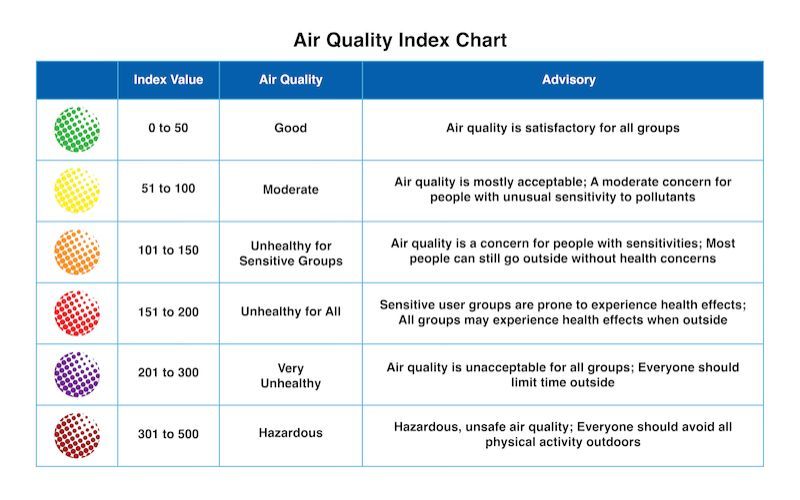
Do air purifiers work for smoke?
Air purifiers can be one of your strongest allies in the fight against wildfire smoke. Air purifiers provide a host of benefits, such as fighting off potential allergens, pet dander, and other toxins in the air.
Generally speaking, the biggest danger when it comes to wildfire smoke is the smaller particulate matter that penetrates the lungs. These can be particularly problematic for those already struggling with lung or heart disease.
To ensure that the air purifier you get is right for your household, you’ll first want to make sure your primary air filter is up to snuff. The best air filter for wildfire smoke will remove particulates from the air using a HEPA filter.
Even the best air filters, however, can’t do it all. While they are the first stop in purifying the air, you’ll want an air purifier as well, especially during wildfire season. The good news is that many air purifiers on the market can be incredibly effective at minimizing wildfire smoke in your home.
What are the best air purifiers for wildfire smoke?
According to the EPA, the particles for wildfire smoke are around 2.5 microns in size. Air purifiers with HEPA air filters are able to remove particles of that specific size from the air. They work by forcing the air inside your home through a mesh filter that catches the harmful particulates and removes them from circulation.
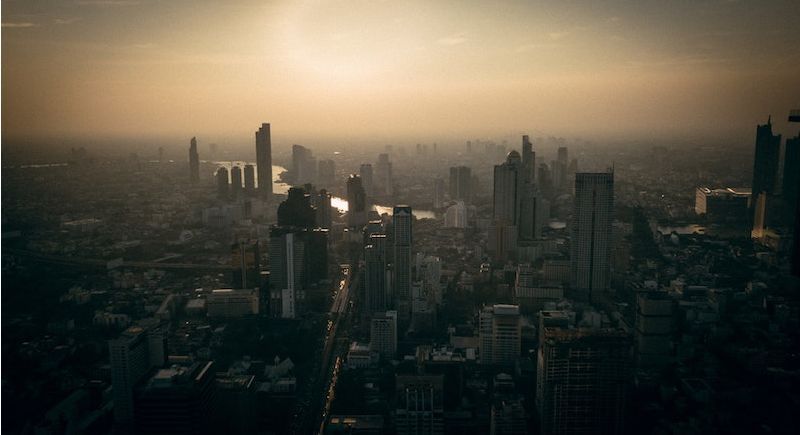
A few other things you’ll want to keep in mind when shopping for an air purifier include:
- In general, the EPA advises against purchasing so-called “ozone generators.” There’s no evidence to suggest that they keep your indoor air clean, and there is even concern that they might cause more harm than good.
- Keep in mind that air purifiers work best when you adhere to their recommended room sizes. Some air purifiers cover smaller spaces; others can handle larger areas. You can get a good sense of the comparisons in room coverage, filter types, and other features using this air purifier guide, which does a side-by-side of the top performers in the category
- If you are in a wildfire area or other situation that is presently affecting your air quality, be sure to keep your air purifiers well-maintained and running 24/7.
Take a breath of fresh air
The old love song says that when your heart is on fire, smoke gets in your eyes. Well, if a local forest is on fire, the results are far less romantic: harmful, irritating fumes seeping into your clothes, your hair, your house, and worst of all, your lungs.
Adding an air purifier to your house’s main spaces can be one of the best things you can do to stay healthy. You’ll stave off other common irritants such as pet dander, bacteria, and even viruses, while breathing better air in general. The only thing you have to lose is a scratchy throat.
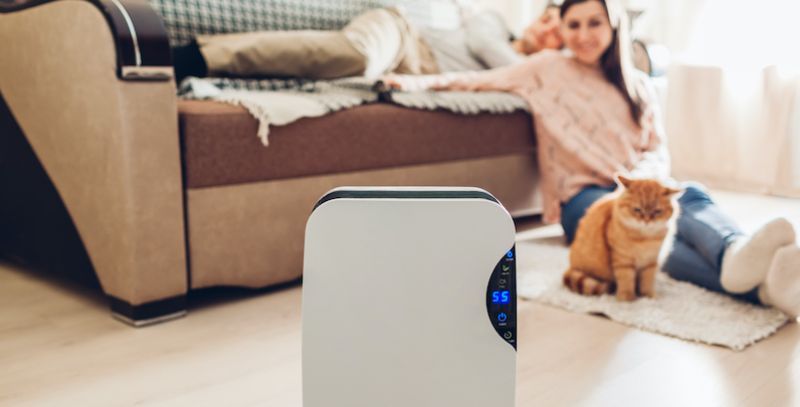
Top Posts
- Exploring Computer Monitors
- Exploring the Benefits of Video Doorbells
- Maintenance for Smoke Detectors
- Treadmills: The Ultimate Guide to Getting Fit
- Rice Cookers for Every Kitchen
- Curling Irons for All Hair Types
- Better Dental Health with Electric Toothbrushes
- Meal Delivery for Celiac Disease & Gluten Intolerance
- Pet Insurance for Cats
- Air Purifiers for Allergies


